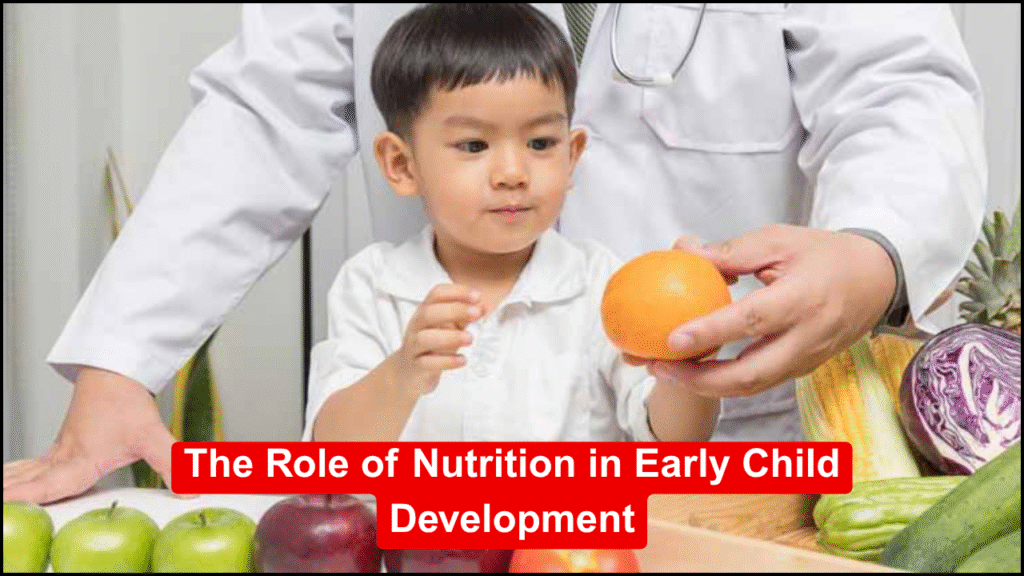
Proper nutrition during the early years of life plays a pivotal role in shaping a child’s growth, brain development, immunity, and long-term health. Nutrients obtained during infancy and early childhood influence both physical and cognitive development, making this period critical for forming the foundation of future well-being. Nutritional deficiencies, even in small amounts, may have irreversible consequences during this stage. A balanced intake of macro and micronutrients, starting even before birth, ensures that children develop optimally and are equipped to reach their full potential.
Table of Contents
Key Nutrients for Early Child Development
- Proteins
- Build and repair tissues.
- Support muscle development and enzyme function.
- Carbohydrates
- Provide essential energy for daily activities and brain function.
- Maintain a healthy weight and metabolic balance.
- Fats
- Supply essential fatty acids like DHA for brain and eye development.
- Aid in the absorption of fat-soluble vitamins.
- Iron
- Supports cognitive development and oxygen transport.
- Prevents anemia and fatigue.
- Zinc
- Strengthens immune function.
- Aids cellular growth and healing.
- Vitamin A
- Promotes vision, immune function, and cell growth.
- Calcium and Vitamin D
- Build strong bones and teeth.
- Regulate neuromuscular functions.
- Iodine
- Facilitates the production of thyroid hormones.
- Essential for brain development in early years.
Stages of Child Nutrition
| Development Stage | Nutritional Focus | Key Food Sources |
|---|---|---|
| Pregnancy (fetal stage) | Fetal brain and organ development | Eggs, dairy, whole grains, leafy vegetables |
| 0–6 months | Exclusive breastfeeding, immune and digestive system support | Mother’s milk |
| 6–12 months | Introduction of solids, iron, and zinc focus | Fortified cereals, mashed vegetables, soft fruits |
| 1–3 years (toddlers) | Rapid growth, development of taste preferences | Whole milk, fruits, eggs, lentils, and small meat portions |
| 4–5 years (preschool) | Cognitive skills, bone strengthening | Dairy, whole grains, nuts, green vegetables |
Impact of Nutrition on Physical Development
- Height and Weight Growth
- Proper nutrient intake results in normal height and weight patterns.
- Malnutrition leads to stunting or wasting.
- Motor Skill Development
- Sufficient protein and iron support muscle strength and coordination.
- Delays in gross and fine motor skills are common in undernourished children.
- Immune System Function
- Micronutrients like zinc and vitamin A prevent frequent infections.
- Well-nourished children are less prone to illness and recover quickly.
Impact of Nutrition on Cognitive Development
- Brain Growth
- The brain develops rapidly in the first 3 years; DHA, iron, and iodine are crucial.
- Deficiencies affect memory, learning, and attention span.
- Language and Social Skills
- Balanced diets improve interaction and communication abilities.
- Malnutrition is linked with delayed speech and lower IQ levels.
- School Readiness
- Children with good nutrition perform better academically.
- Nutritional gaps correlate with lower school attendance and focus.
Common Nutritional Challenges
| Challenge | Description | Potential Effects |
|---|---|---|
| Iron deficiency anemia | Insufficient iron in the diet | Fatigue, poor concentration, and stunted cognitive growth |
| Protein-energy malnutrition | Inadequate protein and calories | Wasting, weakened immunity, delayed milestones |
| Vitamin D deficiency | Limited sun exposure or low dietary intake | Weak bones, rickets |
| Selective eating habits | Toddlers rejecting certain food groups | Imbalance in nutrient intake |
| Overnutrition/Obesity | High intake of fats, sugars, and processed foods | Childhood obesity, risk of diabetes |
Strategies for Improving Early Childhood Nutrition
- Breastfeeding Support
- Encourage exclusive breastfeeding for the first 6 months.
- Offer lactation support programs for new mothers.
- Parental Education
- Provide clear guidance on weaning, meal planning, and balanced diets.
- Educate about hidden hunger and micronutrient needs.
- Meal Diversification
- Incorporate various food groups in meals (fruits, vegetables, protein).
- Reduce dependence on processed and sugary foods.
- Supplementation Programs
- Offer iron, vitamin A, and iodine supplements in at-risk regions.
- Integrate with immunization and child health drives.
- School and Anganwadi Meals
- Ensure meals served in early education centers are nutritionally balanced.
- Monitor regular intake through nutritional surveillance.
Cultural and Societal Influences on Nutrition
- Food Taboos
- Cultural restrictions may prevent the intake of eggs, meat, or dairy during illness or pregnancy.
- Economic Constraints
- Poverty limits access to protein-rich and fresh foods, increasing reliance on starch-based diets.
- Urbanization
- Processed food consumption is higher in urban settings, increasing obesity risks.
- Maternal Health and Nutrition
- A malnourished mother is likely to give birth to a child with low birth weight and poor health indicators.
Role of Policy and Public Health Programs
| Program | Objective | Coverage |
|---|---|---|
| Integrated Child Development Services (ICDS) | Improve the health and nutrition of children under 6 years | Supplementary nutrition, health check-ups, and education |
| Mid-Day Meal Scheme | Provide nutritious meals to preschool and school-going children | Primary and upper primary schools |
| POSHAN Abhiyaan | Reduce stunting, underweight, and anemia | Nationwide mission to improve nutritional outcomes |
| National Iodine Deficiency Disorders Control Programme | Prevent iodine deficiency through salt iodization | All households through awareness and regulation |
Best Practices for Parents and Caregivers
- Start Early
- Ensure maternal nutrition during pregnancy is balanced and nutrient-rich.
- Responsive Feeding
- Pay attention to hunger and fullness cues in children.
- Food Variety
- Rotate foods to avoid monotony and meet different nutrient needs.
- Avoid Force-Feeding
- Allow children to develop a healthy relationship with food.
- Model Healthy Eating
- Practice nutritious eating as a family to encourage good habits.
Monitoring and Evaluation of Child Nutrition
- Growth Tracking
- Regularly measure height and weight using WHO growth charts.
- Development Milestone Checks
- Monitor cognitive, language, and motor development through pediatric assessments.
- Household Dietary Surveys
- Conduct community-level surveys to identify at-risk groups and food insecurity patterns.
- Collaboration with NGOs
- Partner with non-profits to deliver community nutrition education and supplementation.
Moving Forward
Nutrition plays an indispensable role in the physical, cognitive, and emotional development of children. Early years, particularly from conception to age five, offer a critical window to provide essential nutrients that shape a child’s life trajectory. Efforts from families, communities, healthcare providers, and governments must align to ensure that every child receives the nutrition they need to grow into a healthy, capable, and thriving individual.





